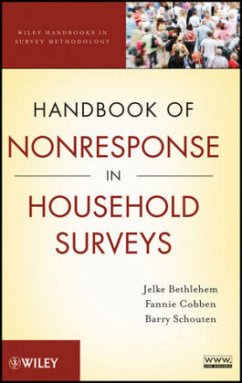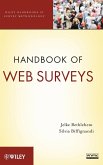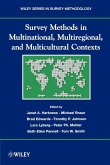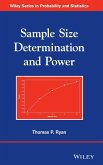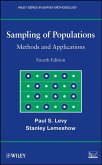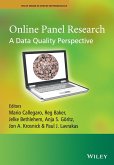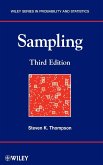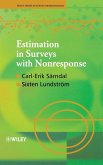Low response rates are a continuing problem for survey organizations. This is a clear-cut guide to detecting, understanding, and preventing nonresponse in modern household surveys. It covers existing sources of error and guidelines for calculating response rates, the theoretical content of survey sampling, ways to analyze and reduce nonresponse, the concept of representativity, weighting adjustment techniques, and approaches for obtaining additional information from nonrespondents. Key theories and formulae are applied to real data sets throughout. Thoroughly class-tested, this resource is for academics and practitioners using survey methods or data in business, government, commercial market research, and official statistics; it also serves as a textbook for graduate-level courses.
A comprehensive, one-stop guide to identifying, reducing, and managing nonresponse in household surveys
Nonresponse and its impact on the sample selection mechanism of a survey is a common problem that often arises while collecting survey data. Handbook of Nonresponse in Household Surveys is a complete guide to handling the nonresponse problem, outlining statistical methods and techniques for improving response rates and correcting response data.
The authors begin with an introduction to the nonresponse problem along with basic concepts and definitions. Subsequent chapters present current theories and methods that enable survey researchers to skillfully account for nonresponse in their research. Exploring the latest developments in the field, the book also features:
An introduction to the R-indicator as an indicator of survey quality
Discussion of the different causes of nonresponse
Extensive treatment of the selection and use of auxiliary information
Best practices for re-approaching nonrespondents
An overview of advanced nonresponse correction techniques
Coverage of adaptive survey design
Throughout the book, the treatment of each topic is presented in a uniform fashion. Following an introduction, each chapter presents the key theories and formulas underlying the topic and then illustrates common applications. Discussion concludes with a summary of the main concepts as well as a glossary of key terms and a set of exercises that allows readers to test their comprehension of the presented material. Examples using real survey data are provided, and a related website features additional data sets, which can be easily analyzed using Stata(r) or SPSS(r) software.
Handbook of Nonresponse in Household Surveys is an essential reference for survey researchers working in the fields of business, economics, government, and the social sciences who gather, analyze, and draw results from data. It is also a suitable supplement for courses on survey methods at the upper-undergraduate and graduate levels.
Hinweis: Dieser Artikel kann nur an eine deutsche Lieferadresse ausgeliefert werden.
A comprehensive, one-stop guide to identifying, reducing, and managing nonresponse in household surveys
Nonresponse and its impact on the sample selection mechanism of a survey is a common problem that often arises while collecting survey data. Handbook of Nonresponse in Household Surveys is a complete guide to handling the nonresponse problem, outlining statistical methods and techniques for improving response rates and correcting response data.
The authors begin with an introduction to the nonresponse problem along with basic concepts and definitions. Subsequent chapters present current theories and methods that enable survey researchers to skillfully account for nonresponse in their research. Exploring the latest developments in the field, the book also features:
An introduction to the R-indicator as an indicator of survey quality
Discussion of the different causes of nonresponse
Extensive treatment of the selection and use of auxiliary information
Best practices for re-approaching nonrespondents
An overview of advanced nonresponse correction techniques
Coverage of adaptive survey design
Throughout the book, the treatment of each topic is presented in a uniform fashion. Following an introduction, each chapter presents the key theories and formulas underlying the topic and then illustrates common applications. Discussion concludes with a summary of the main concepts as well as a glossary of key terms and a set of exercises that allows readers to test their comprehension of the presented material. Examples using real survey data are provided, and a related website features additional data sets, which can be easily analyzed using Stata(r) or SPSS(r) software.
Handbook of Nonresponse in Household Surveys is an essential reference for survey researchers working in the fields of business, economics, government, and the social sciences who gather, analyze, and draw results from data. It is also a suitable supplement for courses on survey methods at the upper-undergraduate and graduate levels.
Hinweis: Dieser Artikel kann nur an eine deutsche Lieferadresse ausgeliefert werden.

